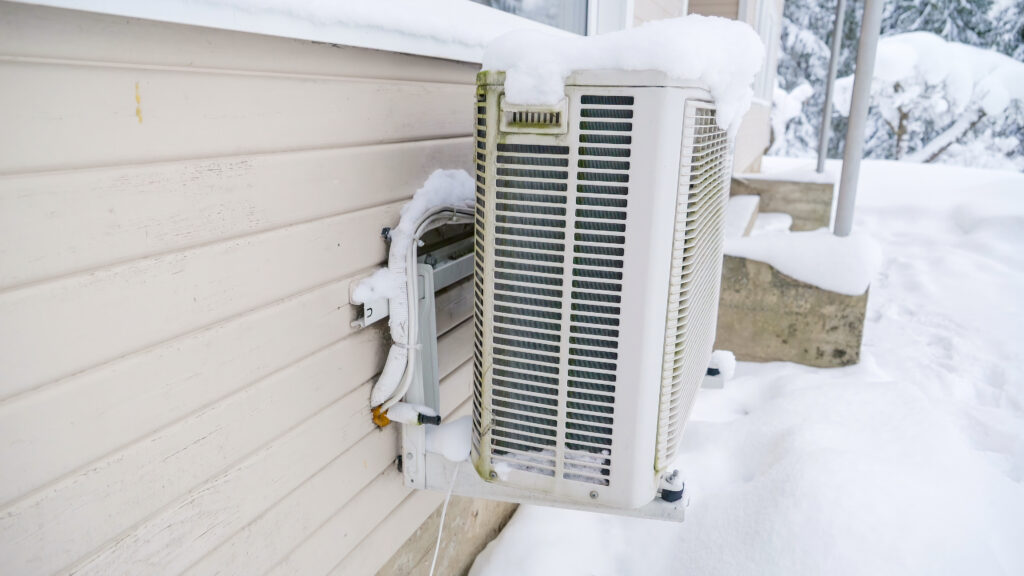There exists a common belief amongst contractors in colder environments that heat pumps aren’t useful in their regions because they wouldn’t be able to perform efficiently or effectively during the harsh winters. The thinking is that the technology is not up to the challenge of the at times severe freezing temperatures, so a furnace is required. This might have been true of older heat pump technologies, but today’s modern enhanced vapor injection inverter technology heat pumps are up to the challenge and are proving to be an excellent addition to any home that will save homeowners money and energy in the long term.
Enhanced vapor injection inverter technology heat pumps are far more energy efficient, comfortable and more cost effective long-term than traditional gas furnace systems. Functioning as both air conditioners in the summertime and heaters in cooler months, this next generation of heat pump compressor technology runs at variable speeds to use the minimum amount of energy needed to maintain consistent comfort for temperature and humidity, while featuring ultra-quiet operation. This technology’s advanced regulation of energy output directly correlates to a decrease in utility bills and the carbon footprint of each house. The benefits are multifactorial.
Many of today’s advanced inverter technology heat pumps meet the fast-approaching 2023 Energy Efficiency Standards, which as of January 1, 2023 will require all newly manufactured residential air conditioners and heat pumps to have 7% higher SEER (seasonal energy efficiency ratio) ratings than previous standards, and commercial units will have a 15% increase in part-load (IEER) efficiency. Most inverter systems operate at a high SEER and HSPF (heating seasonal performance factor) that will meet the new standards. Specifically, according to the U.S. Energy Information Administration, these standards will require no less than 14 SEER for residential systems in the northern part of the United States and 15 SEER in the southern part of the United States, in addition to a minimum 8.8 HSPF. Given the scarcity of existing products that meet these standards, inverter technology heat pumps will become a go-to for residential customers as they make their next HVAC upgrades.
Perhaps the most notable feature of inverter technology heat pumps is that they meet many requirements for advanced systems that decrease residential carbon emissions and make owners eligible for tax credits or rebates from state governments or utility providers. These entities have begun offering rewards to homeowners who switch to more energy efficient HVAC systems, such as inverter technology heat pumps. These rebates exist to offset the upfront cost of installing the latest technology and reward consumers for positive environmental purchase decisions, so homeowners across a broader financial spectrum can afford the upgrade.
The Department of Energy (DOE) is well aware of the efficiencies that inverter technology heat pumps offer, and in February 2022 it launched the Residential Cold-Climate Heat Pump Technology Challenge. This initiative is encouraging the industry to continue to develop the next generation of cold climate heat pump technology which can effectively generate heat during colder weather without the need for inefficient auxiliary heat strips.
Midea, the world’s largest producer of major appliances, recently introduced its EVOX line of single and multi-zone heat pumps in the United States which feature inverter technology in both its standard and M-POWEVI Cold Climate Heat Pumps. Midea’s M-POWEVI Cold Climate Heat Pumps are ideal for the Midwestern home as they are capable of 100% heat output down to -4 degrees Fahrenheit. For the few times when those extreme temperatures are sustained, a series of auxiliary heat strips can automatically activate in stages of 5, 10, and 15 kW as needed to maintain comfortable heating levels without causing a spike in energy consumption. Because of the built-in flexibility and compatibility of today’s next generation heat pumps, a gas furnace can be paired with it as a backup should customers so desire.
Midea’s EVOX system is not the first inverter technology heat pump on the American market, but its suite of products is among the most cost effective, efficient and installer friendly due to industry-leading compatibility with existing systems, even competitors’ components. EVOX equips HVAC contractors with flexible and affordable product and system combinations that can seamlessly mix and match ducted and ductless configurations across multiple applications with up to five zones per heat pump. Midea’s industry-first BI-COM technology allows the EVOX inverter heat pump system to function with the EVOX communicating wall control or existing 24V thermostats or smart/learning controls such as Nest and Ecobee, among many others. As a result, consumers can get the benefits of inverter technology without having to change their existing indoor unit. The Synchro-Connect Technology will make it easier for contractors to make installations and repairs in multi-zone set-ups, helping to streamline installation time and removing potentially costly extra work due to improper wiring or refrigerant line installation. Additionally, Midea’s EVOX heat pumps are Energy Star compliant and hold a high coefficient of performance (COP), heating seasonal performance factor (HSPF) and seasonal energy efficiency ratio (SEER).
Overall, today’s next generation of enhanced vapor injection inverter technology heat pumps offer contractors in the Upper Midwest a flexible, comfortable and efficient option that supports forthcoming energy regulations and promotes long-term cost savings. With more states and utilities looking to reduce energy consumption and move away from fossil fuels, advanced heat pumps may be an ideal solution to reliably, cost-effectively and more sustainably heat homes even during harsher winter conditions.

